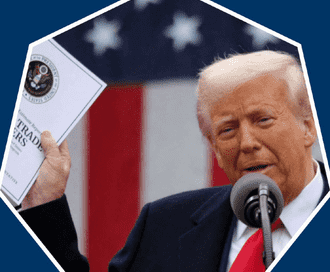Since reclaiming the Oval Office in January 2025, President Donald Trump's signature trade policy—a barrage of aggressive tariffs intended to safeguard American interests—risks inadvertently turbocharging global organized crime networks.
World of Crime’s latest report, Shadow Economies - How President Trump's Tariffs Empower Organized Crime (download here) illustrates the complex ripple effects tariffs might trigger, highlighting how criminal enterprises could swiftly exploit potential economic and regulatory vacuums. While the report focuses mostly on the impact the tariffs will have closer to home, in the US, Canada, and Mexico, it looks at potential effects around the world - from Chinese fentanyl producers to Colombian migrant smugglers.
Below are five key takeaways from the report:
1. Drug Trafficking—Potential New Tariffs, Potential New Routes
Trump’s tariffs, particularly targeting China and Mexico, could unintentionally stimulate illicit drug trafficking routes. Rather than curbing drug flows, trade disruptions might encourage traffickers to diversify supply chains and form deeper, more covert alliances, notably between Mexican cartels and Chinese chemical suppliers.
Historical examples like NAFTA indicate that significant trade shifts dramatically impact smuggling. Essentially, criminal groups could maneuver skillfully within potential tariff-induced chaos. Such developments risk escalating violence, increasing the prevalence of deadly opioids like fentanyl, and heightening national security concerns for the US.
2. Money Laundering—Rise of Illicit Financial Networks
Trade-based money laundering (TBML), already notoriously difficult to detect, could surge due to potential trade wars and elevated tariffs. As legitimate firms grapple with tariff-driven costs, organized crime outfits might seamlessly step in with elaborate invoicing schemes and shell company operations. For instance, during previous U.S.-China tariff conflicts, billions were reportedly misrouted through deceptive documentation. Consequently, intensified financial opacity could facilitate not only cartel profits but potentially terrorist financing as well, undermining financial transparency and national security.
3. Smuggling and Counterfeiting—Booming Black Markets
Trump’s tariffs may generate substantial price differentials, potentially creating lucrative opportunities for smugglers and counterfeiters. Organized crime might rapidly exploit these arbitrage opportunities, potentially flooding markets with counterfeit products and employing sophisticated smuggling routes to evade tariffs.
During the 2018 U.S.-China tariff conflict, counterfeit goods falsely labeled "Made in Vietnam" infiltrated US markets—a scenario that could repeat under new tariff regimes. Such a development might lead to lost revenues for legitimate businesses, safety hazards from counterfeit goods, and an enhanced black-market infrastructure.
4. Human Trafficking—Risk of Increased Desperation and Exploitation
Tariffs combined with restrictive immigration policies could inadvertently bolster human smuggling networks. While in early 2025, migrant crossings at the US-Mexico border dropped rapidly, economic hardships resulting from tariff impacts in affected countries could reverse this trend.
Trump's tariff threats toward Mexico might trigger unemployment and instability, possibly driving desperate migrants into the hands of dangerous smugglers and escalating cases of forced labor and exploitation. Such restrictive measures risk paradoxically enhancing the profitability of organized crime and exacerbating human suffering along perilous migration routes.
5. Potential Direct Harm to US Interests
Instead of protecting American interests, the report underscores that Trump's proposed tariff regime could significantly backfire domestically. There is a risk of reversing public health gains by inadvertently facilitating drug trafficking, weakening economic stability through lost tariff revenues, compromised financial institutions, and increased costs from illicit trade. These negative impacts could compound to erode consumer safety, and strain law enforcement resources.
Shadow Economies - How President Trump's Tariffs Empower Organized Crime argues that tariffs cannot be wielded as blunt instruments without potential blowback. They might inadvertently empower sophisticated crime syndicates adept at capitalizing on disruption, presenting considerable strategic, economic, and humanitarian risks.




